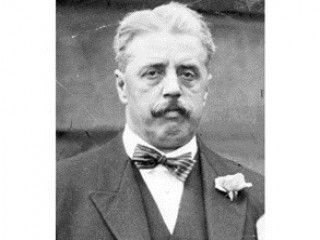
Arnold Bennett biography
Date of birth : 1867-05-27
Date of death : 1931-03-31
Birthplace : Hanley, England
Nationality : British
Category : Famous Figures
Last modified : 2010-12-21
Credited as : Novelist and dramatist, wrote The Old Wives' Tale, Five Towns
The English novelist and dramatist Arnold Bennett was the author of The Old Wives' Tale, a masterpiece of realism.
Arnold Bennett was born on May 27, 1867, in Hanley, one of the pottery-making "Six Towns" of central England. The youth, called Enoch, spoke with a stammer and was determined to make his living in literature. After attending local schools and working in his father's law office, he moved to London in 1888 to become a writer. In 1893 he was employed by the magazine Woman, and in 1898 he published his first novel, A Man from the North. During these years he began to call himself Arnold Bennett. In 1902 Bennett published two novel, Anna of the Five Towns and The Grand Babylon Hotel—the first realistic, the second sensational. They represent the pattern of his work: fiction of serious artistic purpose produced at the same time as material of no artistic value.
Bennett lived in France from 1902 to 1913. Shortly after his fortieth birthday he married Marguerite Soulie. The couple seemed happy but within a few years proved incompatible. During these years Bennett wrote magazine articles, self-help books, plays, short stories, and novels—a tremendous output. Most of it, however, was written only to make money. But Tales of the Five Towns and the trilogy Anna of the Five Towns (1902), Leonora (1903), and Sacred and Profane Love (1904) are worth mention, for in them Bennett began his realistic studies of life in the industrial "Five Towns," changed from the actual "Six Towns" for reasons of euphony.
The sight of an old woman in a restaurant in Paris in 1903 gave Bennett the idea for a novel that would, as he wrote, "go one better" than Guy de Maupassant's realistic novel Une Vie. While writing other books he nourished the idea, and in 1907 he began to write it. The novel came quickly, a thousand words or more each day. After various interruptions, including the writing of Buried Alive (1908) and the production of his play Cupid and Commonsense (1908), The Old Wives' Tale was completed and published in 1908. It is the story of the sisters Constance and Sophia Baines from their girlhood in Bursley, one of the "Five Towns," to their deaths 50 years later. Constance stayed at home; Sophia, like Bennett, escaped to Paris. The story realistically depicts the minute changes by which the girls become old women.
The Old Wives' Tale brought Bennett fame and money. He secured his position as an eminent author with the "Clayhanger" novels (Clayhanger, 1910; Hilda Lessways, 1911; These Twain, 1916), which are meticulous studies of love, marriage, and society in the "Five Towns." Meanwhile, he capitalized on his position with light novels, a travel book about the United States, and several plays, of which Milestones (1912), written with E. Knoblock, is best known.
During World War I Bennett served his country as a journalist and civil servant. He separated from his wife in 1921, and in 1922 he met Dorothy Cheston, an actress, by whom he had a daughter in 1926. In the 1920s Bennett's critical reputation declined, and his carefully objective realism became old-fashioned. During this period his literary productions were not equal to his best, though Riceyman Steps (1923) evinced a brief return of his talent. His popular reputation, however, was never higher, and his novels and journalistic work made him one of the highest-paid writers of his day. Displays of his portrait on posters advertising his works made his pleasantly distinctive face with its heavy-lidded gaze and prominent teeth familiar to thousands. After a trip to France during which he caught typhoid fever, Bennett died on March 31, 1931.
Newman Flower, ed., The Journals of Arnold Bennett (3 vols., 1932-1933), provides an indispensable account of his activities but reveals the inner man only unintentionally. Perhaps the best life of Arnold is Reginald Pound, Arnold Bennett: A Biography (1953). Two critical attacks on Bennett are Virginia Woolf, Mr. Bennett and Mrs. Brown (1924) and passages in E.M. Forster, Aspects of the Novel (1927). E.M.W. Tillyard defends The Old Wives' Tale in The Epic Strain in the English Novel (1958). American academic criticism is best represented by James Hall, Arnold Bennett: Primitivism and Taste (1959), and James G. Hepburn, The Art of Arnold Bennett (1963). The best brief introduction to the historical background is in Boris Ford, ed., The Pelican Guide to English Literature, vol. 7: The Modern Age (1958; rev. ed. 1962).
Bennett, Arnold, Over there; war scenes on the Western Front, Plainview, N.Y., Books for Libraries Press 1975.
Bennett, Arnold, Sketches for autobiography, London; Boston: G. Allen & Unwin, 1979.
















